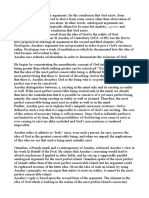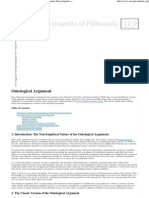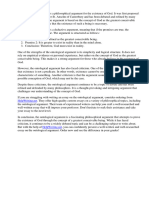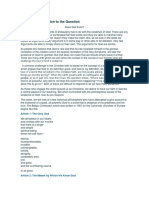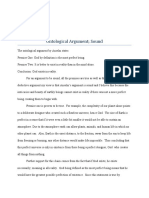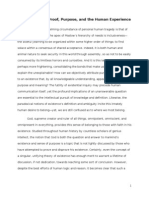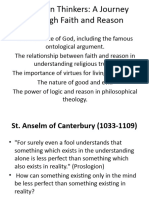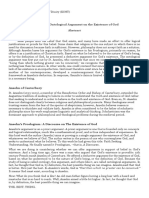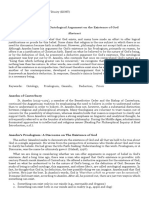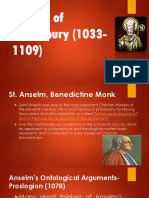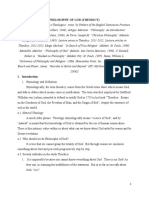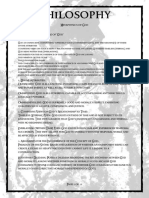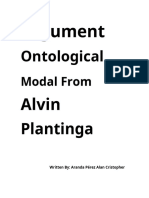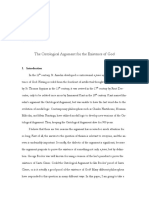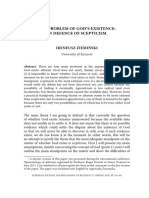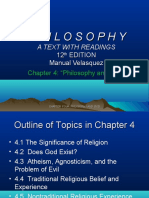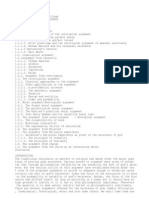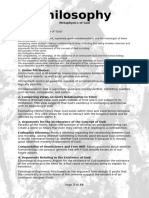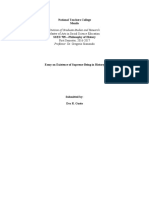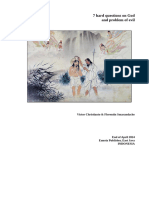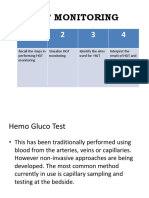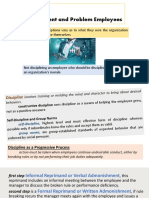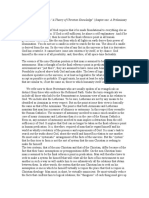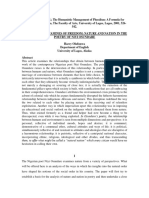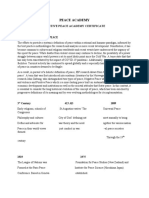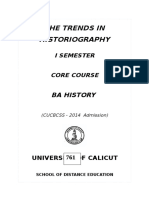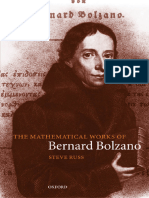Ontological Essay
Ontological Essay
Uploaded by
claire yowsCopyright:
Available Formats
Ontological Essay
Ontological Essay
Uploaded by
claire yowsOriginal Title
Copyright
Available Formats
Share this document
Did you find this document useful?
Is this content inappropriate?
Copyright:
Available Formats
Ontological Essay
Ontological Essay
Uploaded by
claire yowsCopyright:
Available Formats
Ian Wong
Rev. Blackhall
16 October 2015
Ontological Argument Essay
The term ontological argument was first coined by Immanuel Kant in ‘the critique of
pure reason’ to describe a priori, deductive, analytic arguments. Another term for a priori is
propter quid. The word ontological is devised from the greek verb einai meaning ‘to be’ and
ontological arguments try to show that existence is a natural part of Gods being. Moreover
the ontological argument is the only a priori argument, it does not start from some feature of
the world but rather from a definition of God. It therefore seeks to move from a definition of
God to the reality of God. It was put forward in two forms by St. Anselm. Kant was
considered to have demolished it but the argument has recently generated new interest. It is
said that in order to understand the ontological argument, the difference between an analytic
statement and a synthetic statement must be understood. As such, and analytic statement is
one where the predicate is included within the subject. On the other hand, a synthetic
statement is one where the predicate is not included within the subject. Synthetic statements
could only be known to be true by enquiry, through experience.
St. Anselm is the name most firmly associated with the ontological argument and in the
11th century, whilst he was archbishop of Canterbury, he wrote two treaties which have
become the foundation of the argument. He wont the monologic and the proslogion. Anselm
was primarily concerned with showing that it is reasonable to believe in God. He directed the
monologic to atheists and agnostics in the hope that the rationality of his argument would
help atheists to believe and to show that atheism cannot be coherently maintained. The
ONTOLOGICAL ARGUMENT ESSAY !1
monologic arguments starts by stating that everybody, including atheists and agnostics, desire
things in life which they suppose to be good. Because of this, Anselm argues, all people must
have an idea of goodness and justice in their minds. Anselm further argues in the monologic
that all of the principles which help us to understand truth, beauty, goodness and justice are
to be discovered in God, a being who is ‘good through itself since every other good is good
through it’. He claims that it is God who gives us the ability to rank goods.
In the preface of the proslogion (which is an address to God) Anselm states: “I have
written the following treatise in the person of one who… seeks to understand what he
believes.”. Anselm argues that God is indeed by definition that than which nothing greater
can be conceived. This definition is understood by believers and non-believers. It is one thing
to exist in the mind alone and another to exist both in the mind and in reality. He further
states that it is greater to exist in the mind and in reality than to exist in the mind alone. Thus,
God must exist both in reality as well as in the mind. If God is just an idea in the mind, then
the definition points to something greater- a God who exists both in the mind and in reality.
In Anselm’s second argument he argues that the atheist does not believe in God either
because he has not heard of God, or because he is irrationally ignorant and chooses not to
believe in God. Anyone who reflects on why there is goodness in the universe, for Anselm,
must conclude that it comes from God. Hence, the proslogion was written with the existence
of God having already been established and the definition of God having been already
decided: the definition is not an assumption, but it is arrived at through reason. Peter Vardy
points out that the proslogion is written as a prayer, it is written as a conversation with God.
This could be seen through the beginning of the writing which states: ‘come then, Lord my
God, teach my heart where and how to seek you. Where and how to find you.’ The
proslogion is not written to prove God’s existence, Anselm believes he has achieved this in the
Monologic. The proslogion is an explanation of what is believed not a proof of what is
ONTOLOGICAL ARGUMENT ESSAY !2
believed, the proslogion begins its argument from the perspective of faith and Anselm argues
that it is only with faith that we can hope fro a true understanding of the existence and nature
of God.
The proslogion consists of two arguments, both a priori, propter quid arguments which
start from a first principle or definition arrived at through reason. They are also both reductio
ad absurdum arguments which aim to show that disagreement with the argument is logical
absurdity. It claims that God cannot not exist. The argument in proslogion two attempts to
show that the non-existence of God contradicts our definition of God and proslogion three
attempts to demonstrate that God mist exist necessarily and the if God exists only
contingently, this contradicts our definition.
Ever since Anselm wrote the proslogion, many philosophers have been attracted to the
ontological argument, and it has hence undergone many revisions to try to make it work. The
list of philosophers who have revised the arguments is endless, however, one of who is named
Rene Descartes. He was a rationalist; this means that for him, philosophical truth was to be
found in the operations of the mind and sense data was to be considered flawed and
untrustworthy. This is very important as it highlights the distinction between inductive and
deductive proofs in philosophy. Descartes argument is deductive and follows a pattern which
states that he has an idea of a supremely perfect being; existence is a predicate or quality of a
supremely perfect being; a supremely perfect being hence exists. All in all, Descartes is stating
that he has an idea of God in his mind. This however, is not an a priori claim. He further
argues that this being exists necessarily. he then further goes on to argue that to state that God
does not exist would be self-contradictory as existence is a predicate of the supremely perfect
being: it would be like saying that a circle has four sides. Descartes argues that there is an
objective necessity that connects God to existence, just as there is an objective necessity
connecting a mountain to a valley: you simply cannot have one without the other.
ONTOLOGICAL ARGUMENT ESSAY !3
B) Assess the claim that the weakness of this argument overcome its strengths
After the proslogion was published, an attempt to refute the argument was
produced by Guanilo of Marmoutiers and it is called Pro Insipiente: ‘On behalf of
the fool’. Anselm was so impressed with this argument, that he requested that it be
published alongside future publications of the Monologic and Proslogion. Anselm in
reply to Guanilo’s Argument stated that he thanks Guanilo for his kindness both in
criticising and praising his tract. Guanilo’s argument essentially states that the logic of
inseam’s argument can be used mutatis mutandis (by substitution of terms) to prove
the existence of a perfect island. Guanilo in his critique states that if we imagine the
greatest possible island, then this island must exist. He is effectively saying that we
cannot define something into existence. Anselm’s reply is to say that his argument and
the sequence of his reasoning only applies to God- as only God has all perfections.
Guanilo is hence saying that God is merely the greatest actual being just as the island
is the greatest actual island- but this is not what Anselm is saying. Anselm is claiming
that God is the greatest possible being and his argument only applies to God. To this
argument Anselm had a response that was in two parts. He claimed that Islands are
contingent and God exists necessarily. Islands are caused to exist and may go out of
existence, God is not subject to either of those problems hence God cannot not exist.
Therefore the non existence of the island is a possibility and this counts against it
being that than which no greater can be conceived. The second part of his response
concerns objectivity and subjectivity. For Anselm,as a Platonist, his idea of God is
objective and immutable. God cannot change. Islands however, as they are contingent,
are subjective. One persons idea of the perfect island may not match up to another
persons. For Anselm, God exists objectively and his nature does not vary from person
ONTOLOGICAL ARGUMENT ESSAY !4
to person: there is one, objective true God and it is our duty to use reason and faith to
arrive at knowledge and understanding of this objective reality.
St. Thomas Aquinas, Aristotelian and philosopher, rejected the ontological
argument proposed by Anselm. Aquinas believed that we have to arrive at truth by
starting with an observation. He further claims that we do not have an agreed
definition of God. Many people indeed have different ideas of God- some people even
hold that God has a body in which Aquinas considers to be absurd. Aquinas also
states that we can reason to God from the effects of God’s action in the world.
Aquinas himself does not consider that we know God’s nature, so a real
understanding of God’s nature is impossible to us. However, Aquinas holds that if we
understand God’s nature, then we would know that God’s nature does have to include
existence but as we do not know God’s nature, we have to treat it as synthetic. Hence,
all in all, Aquinas is stating that the claim that God exists is analytically true, however
it cannot be confirmed that this is to be the case and hence we can only treat it as
synthetically true. We can, therefore only argue to God using experience as as starting
point. Each of Aquinas’ five ways is an a posteriori argument based upon an initial
sense experience, such as the teleological and cosmological arguments.
Immanuel Kant first called this the ontological argument due to the fact that he
thought that the argument made an illegitimate jump from ideas to reality. He realised
that he had certain objections to his argument including which he states that we have
no clear idea of a necessary being, God is defined largely in negative rather than in
positive terms. He also states that the only sort of necessity is where statements are
necessary because of the way words and language are used. It applies to propositions
not to reality. There are no necessary propositions about existence. He further claims
that what is logically possible may not be ontologically possible. it is try that a triangle
ONTOLOGICAL ARGUMENT ESSAY !5
must have three sides, or a unicorn must have a horn but this does not mean that there
are any triangles or unicorns. The last point he makes as an objection to the argument
is that existence to him is not a predicate or a perfection. This is the one major point
he makes and further elaborates by saying that whatever adds nothing to the concept
of an essence is not part of that essence. Existence in itself adds nothing to the
concept of an essence- to say that a hundred dollars is real rather team imaginary
does not ass any characteristics to a dollar, Existence is not part of the essence of a
thing, it is neither a perfection. In summary, Kant claimed that Anselm’s argument
could be summed up by saying that to Anselm, an absolutely perfect being must have
all possible perfections, existence in itself is a possible perfection, therefore an
absolutely perfect being must have an existence as one of its perfections. Kant rejects
the point which states existence is a possible perfection. He states that one can have an
idea of something, yet however much you develop the idea, you have to go outside it
by getting evidence from experience as to whether or not it exists. Hume stated that
necessary existence is not a coherent concept because it makes a false assumption
about existence. However, we must go out of the object to determine whether o r not
it exists, we cannot therefore determine something into its existence.
Another philosopher, Bertrand Russell, argues that when we say ‘cows exist’
what we are really saying is that the concept of cow is initiated whereas the concept of
unicorn is not. In this, Russell follows Frege who argues that ‘exists’ tells us that a
particular thing is instantiated or exists rather than being a predicate. In his famous
example, tame tigers exist, exists here is not a predicate, it adds nothing to our
knowledge of tigers. All it is saying is that the concept of tame tigers is instantiated.
While by contrast, tame tigers eat a lot, does tell us something about tame tigers,
therefore functions as a predicate.
ONTOLOGICAL ARGUMENT ESSAY !6
Alvin Platinga revised the ontological argument, making use of a technique in
philosophy called modal logic. Modal logic makes use of possible worlds to explore
ideas of existence, necessity and possibility. Plating spent many years rejecting the
ontological argument, but believed that modal logic could be employed to make it
work. Platinga’s version of the argument relies upon two concepts that help us to
define who God is. Maximal excellence which is having omnipotence, omniscience,
moral perfection. This is the God of classical theism. Maximal greatness is when one
has maximal excellence in every possible world. If a being exhibits maximal greatness,
it exhibits maximal excellence in every possible world. Platinga further agues that
maximal greatness is possibly exemplified, in other words, it is not a logical
contradiction to state that it would be possible for a being of maximal greatness to
exist in a world somewhere. Platinga uses this as a starting point for his argument and
then using subtle logic, tries to argue that if it is possible for this being to exist in a
possible world, a being of maximal excellence must exist in every world. He claims
that what is necessarily true does not vary from world to world.
After discussing the two arguments presented by Anselm, another philosopher
by the name of Normal Malcolm comments on them. Malcolm accepts that the first
fails. He states that if God does not exist, God cannot come into existence now,
because God would be contingent on some way and would therefore not be God. He
also argues that if God does exist now, he cannot go out of existence. This means that
God’s existence is either impossible or necessary. Malcolm then argues that God’s
existence can only be impossible if it is logically absurd or contradictory. Because it is
neither of these things, God’s existence must be necessary.
All in all, after the in depth analysation of the arguments presented by the
various philosophers, it could be concluded that the argument does not prove God
ONTOLOGICAL ARGUMENT ESSAY !7
exists de re. However the argument still has value that it is sensible to talk about the
existence of God for those who believe in God. The premises that state the definition
of God, and the claim that existence is both a property and a perfection must be
accepted. There tends to be three groups in the current society, tho that think the
argument works, those that think the argument fails for theological reasons, such as
Aquinas, who believed that we can never presume to know what God’s nature is like,
and those that think the argument is doomed to failure because of the very nature of
the argument itself, we cannot use an a priori reasoning to prove something exists.
ONTOLOGICAL ARGUMENT ESSAY !8
You might also like
- A Guide to How to Think Like SocratesDocument14 pagesA Guide to How to Think Like SocratesdonaldNo ratings yet
- Ecg MonitoringDocument26 pagesEcg Monitoringclaire yowsNo ratings yet
- Anselm's Argument Reconsidered PDFDocument25 pagesAnselm's Argument Reconsidered PDFquodagisNo ratings yet
- Brian Stock - The Implications of Literacy - Written Language and Models of Interpretation in The Eleventh and Twelfth Centuries (1987) PDFDocument615 pagesBrian Stock - The Implications of Literacy - Written Language and Models of Interpretation in The Eleventh and Twelfth Centuries (1987) PDFpsychokill65No ratings yet
- Analyze The Distinctive Features of The Ontological Argument For The Existence of GodDocument9 pagesAnalyze The Distinctive Features of The Ontological Argument For The Existence of GodManny LauNo ratings yet
- POR Assignment 1Document3 pagesPOR Assignment 1Aanya BhargavaNo ratings yet
- Essay 1Document6 pagesEssay 1aya sleimanNo ratings yet
- PhilosophyDocument17 pagesPhilosophygargvinit06No ratings yet
- Unit 8Document14 pagesUnit 8828YogeshNo ratings yet
- Ontological ArgumentDocument3 pagesOntological ArgumentMeera KhemaniNo ratings yet
- Ontological Argument For The Existence of GodDocument7 pagesOntological Argument For The Existence of GodWilliam GallasNo ratings yet
- Position Paper AnselmDocument4 pagesPosition Paper Anselmexe. courseNo ratings yet
- Philosophy IA Sample D High MarksDocument4 pagesPhilosophy IA Sample D High Marksthatguy uwuNo ratings yet
- Ansel Ontological ArgumentDocument14 pagesAnsel Ontological ArgumentRafael RoaNo ratings yet
- Anselm, Aquinas, and Pascal On The Existence of GodDocument4 pagesAnselm, Aquinas, and Pascal On The Existence of GodMichael BlasserNo ratings yet
- Ontological Argument EssayDocument7 pagesOntological Argument EssayafmocrkjbNo ratings yet
- The Ontological ArgumentDocument8 pagesThe Ontological ArgumentHannah Mohy-EldinNo ratings yet
- The Ontological ArgumentDocument10 pagesThe Ontological Argumentapi-232312177No ratings yet
- Reading: Introduction To The Question: Article 1: The Only GodDocument10 pagesReading: Introduction To The Question: Article 1: The Only GodBenjaminFigueroaNo ratings yet
- Philosophy Paper Number UnoDocument3 pagesPhilosophy Paper Number UnoJordan R. SmithNo ratings yet
- Anselm The Ontological ArgumentDocument6 pagesAnselm The Ontological ArgumentPascal AssafNo ratings yet
- Is It Really Possible To Talk About GodDocument1 pageIs It Really Possible To Talk About GodFrancisco PonceNo ratings yet
- Arguments For God's ExistenceDocument3 pagesArguments For God's ExistenceMark Ian ValdezNo ratings yet
- Explain How Descartes Developed Anselm's Ontolohical ArgumentDocument3 pagesExplain How Descartes Developed Anselm's Ontolohical ArgumentCiara MoranNo ratings yet
- God Existence - Proof, Purpose, and The Human ExperienceDocument7 pagesGod Existence - Proof, Purpose, and The Human ExperienceScott RuzalNo ratings yet
- Christian ThinkersDocument44 pagesChristian ThinkersPaoloRussoNo ratings yet
- 8 Anselm and AquinasDocument5 pages8 Anselm and AquinasAdette Thessa ManuelNo ratings yet
- PHILOS 1E03 Exam ReviewDocument25 pagesPHILOS 1E03 Exam ReviewdhandeepthiaraNo ratings yet
- Gale Researcher Guide for: Introduction to the Philosophy of ReligionFrom EverandGale Researcher Guide for: Introduction to the Philosophy of ReligionNo ratings yet
- Philo 106 FInal PaperDocument2 pagesPhilo 106 FInal PaperNicole Dorado100% (1)
- Copy St. Anselm's Ontological Argument On The Existence of GodDocument3 pagesCopy St. Anselm's Ontological Argument On The Existence of GodWinston QuilatonNo ratings yet
- TheologyDocument2 pagesTheologyfbeny29No ratings yet
- St. Anselm's Ontological Argument On The Existence of GodDocument4 pagesSt. Anselm's Ontological Argument On The Existence of GodWinston QuilatonNo ratings yet
- Anselm of Canterbury (1033-1109)Document14 pagesAnselm of Canterbury (1033-1109)Cabatit Glenn ReyesNo ratings yet
- Philosophical Arguments About GodDocument63 pagesPhilosophical Arguments About GodAdam WhitesnowNo ratings yet
- Philosophy of God (Theodicy)Document14 pagesPhilosophy of God (Theodicy)Paulo Margallo OrtegaNo ratings yet
- The OntologicalDocument7 pagesThe OntologicalYasser SaidNo ratings yet
- Be Conceived.-That Which Can Be Conceived Not To Exists Is Not God.' St. Anselm Began HisDocument5 pagesBe Conceived.-That Which Can Be Conceived Not To Exists Is Not God.' St. Anselm Began HisAnonymous kDxt5UNo ratings yet
- Existence of GodDocument9 pagesExistence of Godjust-joshNo ratings yet
- Metaphysics of GodDocument31 pagesMetaphysics of GodinvisibleblakeNo ratings yet
- Ontologic Argument - PlantingaDocument7 pagesOntologic Argument - PlantingaBaruch R JhoiNo ratings yet
- Baggaley John The Ontological Argument For The Existence of GodDocument29 pagesBaggaley John The Ontological Argument For The Existence of GodPTk Daryl Cabañero TayongNo ratings yet
- God's Existence-Final PaperDocument23 pagesGod's Existence-Final PaperMarwil Baculo De Roxas100% (2)
- Faith and Reason: Ways of Believing: The Cosmological ArgumentDocument2 pagesFaith and Reason: Ways of Believing: The Cosmological ArgumentMauricio LuceroNo ratings yet
- Proof of GOD ExistenceDocument8 pagesProof of GOD Existenceعلیزہ علیNo ratings yet
- IGNOU Philosophy of ReligionDocument11 pagesIGNOU Philosophy of ReligionjagatividyasagarNo ratings yet
- Why Do We Believe in GodDocument12 pagesWhy Do We Believe in GodAruver SharmaNo ratings yet
- O P E G B N E: T O A: Norman MalcolmDocument21 pagesO P E G B N E: T O A: Norman MalcolmJuan Carlos AcostaNo ratings yet
- The Problem of God's ExistenceDocument21 pagesThe Problem of God's ExistencecjotafredesNo ratings yet
- Monologian (Influence)Document2 pagesMonologian (Influence)Madhumalaka FernandoNo ratings yet
- Ch4pptvelasquez12 150815160344 Lva1 App6892Document76 pagesCh4pptvelasquez12 150815160344 Lva1 App6892Mohammad MoosaNo ratings yet
- Arguments For The Existence of GodDocument27 pagesArguments For The Existence of GodBrito RajNo ratings yet
- Ontological ArgumentDocument9 pagesOntological Argumentprajapatib24No ratings yet
- A Defense of The Modal Ontological ArgumentDocument13 pagesA Defense of The Modal Ontological ArgumentRayan Ben YoussefNo ratings yet
- Thesis Statement Does God ExistDocument8 pagesThesis Statement Does God Existoaehviiig100% (1)
- AQUINASUnmoved Mover 2Document3 pagesAQUINASUnmoved Mover 2RichardDinongPascualNo ratings yet
- Metaphysics of GodDocument26 pagesMetaphysics of GodinvisibleblakeNo ratings yet
- The Case Against Presupposition - Mitchell LeBlancDocument37 pagesThe Case Against Presupposition - Mitchell LeBlancAaron Wilkerson100% (1)
- DescartesDocument4 pagesDescartesmaximilliandhutchingsNo ratings yet
- National Teachers College Manila: Division of Graduate Studies and ResearchDocument14 pagesNational Teachers College Manila: Division of Graduate Studies and ResearchSolomon GustoNo ratings yet
- 7 Hard Questions On God and Problem of EvilDocument42 pages7 Hard Questions On God and Problem of EvilVictor HermannNo ratings yet
- St. Ann Philosophy, Four Causes, Proofs of God's Existence, Nov. 16, 2018Document20 pagesSt. Ann Philosophy, Four Causes, Proofs of God's Existence, Nov. 16, 2018Thaddeus KozinskiNo ratings yet
- Religious StudiesDocument23 pagesReligious StudiesAleiyandraNo ratings yet
- 118 Rle Ecg PDFDocument5 pages118 Rle Ecg PDFclaire yowsNo ratings yet
- HazmatDocument20 pagesHazmatclaire yowsNo ratings yet
- 118 RLE Infection Control PDFDocument15 pages118 RLE Infection Control PDFclaire yowsNo ratings yet
- 118 RLE Mechanical Ventilation PDFDocument5 pages118 RLE Mechanical Ventilation PDFclaire yowsNo ratings yet
- Lesson 1.1 Historical Perspectives of NiDocument24 pagesLesson 1.1 Historical Perspectives of Niclaire yowsNo ratings yet
- 118 RLE Glasgow Coma Scale GCS PDFDocument4 pages118 RLE Glasgow Coma Scale GCS PDFclaire yowsNo ratings yet
- 3 Colostomy Care Irrigation PLPDocument3 pages3 Colostomy Care Irrigation PLPclaire yowsNo ratings yet
- 0 Week 8 Hypothesis PDFDocument3 pages0 Week 8 Hypothesis PDFclaire yowsNo ratings yet
- BIOTERRORISMDocument11 pagesBIOTERRORISMclaire yowsNo ratings yet
- Infection Control MeasuresDocument33 pagesInfection Control Measuresclaire yowsNo ratings yet
- 118 Rle Ecg 2 PDFDocument3 pages118 Rle Ecg 2 PDFclaire yowsNo ratings yet
- Mechanical VentilationDocument16 pagesMechanical Ventilationclaire yowsNo ratings yet
- 118 RLE Suction PDFDocument4 pages118 RLE Suction PDFclaire yowsNo ratings yet
- Frameworks For Ethical Decision-Making - PLP1Document23 pagesFrameworks For Ethical Decision-Making - PLP1claire yowsNo ratings yet
- 118 Rle Abg PDFDocument6 pages118 Rle Abg PDFclaire yowsNo ratings yet
- Female CatheterizationDocument11 pagesFemale Catheterizationclaire yowsNo ratings yet
- HGT MonitoringDocument9 pagesHGT Monitoringclaire yowsNo ratings yet
- Controlling PLPDocument17 pagesControlling PLPclaire yowsNo ratings yet
- Continuation Controlling - PLPDocument7 pagesContinuation Controlling - PLPclaire yowsNo ratings yet
- Delegation PLPDocument22 pagesDelegation PLPclaire yowsNo ratings yet
- Motivating Climate PLPDocument29 pagesMotivating Climate PLPclaire yowsNo ratings yet
- WEEK 3 119 LEC 2 - Leadership - and - Management PDFDocument8 pagesWEEK 3 119 LEC 2 - Leadership - and - Management PDFclaire yowsNo ratings yet
- 11 Uterine CancerDocument43 pages11 Uterine Cancerclaire yowsNo ratings yet
- Accidentally in Loveeeeeee Shrek RulesDocument1 pageAccidentally in Loveeeeeee Shrek Rulesclaire yowsNo ratings yet
- Conflict Management PLPDocument27 pagesConflict Management PLPclaire yowsNo ratings yet
- PK Reflection Paper PDFDocument3 pagesPK Reflection Paper PDFclaire yowsNo ratings yet
- Pronunciation GuideDocument7 pagesPronunciation Guideclaire yowsNo ratings yet
- 11 Prostate CancerDocument52 pages11 Prostate Cancerclaire yowsNo ratings yet
- 70 Deduction (Deciding That Something Is Probable) : Should, Ought To, EtcDocument1 page70 Deduction (Deciding That Something Is Probable) : Should, Ought To, EtcImanol PascualNo ratings yet
- 24 7 LocksmithDocument2 pages24 7 Locksmithapi-689580978No ratings yet
- Dr. Cornelius Vantil - "A Theory of Christian Knowledge" (Chapter One: A PreliminaryDocument3 pagesDr. Cornelius Vantil - "A Theory of Christian Knowledge" (Chapter One: A PreliminaryhtrondkcajNo ratings yet
- Fields of Faith Famines of Freedom NaturDocument17 pagesFields of Faith Famines of Freedom Naturworks.adekolaNo ratings yet
- Business D Mikitani en 33360Document5 pagesBusiness D Mikitani en 33360uppdeep85No ratings yet
- Literary AnalysisDocument2 pagesLiterary AnalysisHanna Jane CabasagNo ratings yet
- 2457 2452 1 PBDocument31 pages2457 2452 1 PBcekrikNo ratings yet
- Fichas de Aprendizaje Q Skills Unit 5 - Why Do People Take Risks - QuizletDocument2 pagesFichas de Aprendizaje Q Skills Unit 5 - Why Do People Take Risks - Quizletcalderonmaes3No ratings yet
- Literature A Night OutDocument2 pagesLiterature A Night OutKartini Binti Yusof0% (1)
- QoatesDocument14 pagesQoatesrafiNo ratings yet
- Peace AcademyDocument3 pagesPeace AcademySam ChillaNo ratings yet
- Gen Ed: Understanding The Self Prelim Examination: University of San Jose - Recoletos Department of PsychologyDocument2 pagesGen Ed: Understanding The Self Prelim Examination: University of San Jose - Recoletos Department of PsychologyMay Almerez- Wong100% (1)
- Download Self And Identity 1st Edition Matthew Tieu ebook All Chapters PDFDocument81 pagesDownload Self And Identity 1st Edition Matthew Tieu ebook All Chapters PDFnausakaiju59100% (11)
- BA History - I Sem - Core Course - The Trends in Historiography - 2015Document31 pagesBA History - I Sem - Core Course - The Trends in Historiography - 2015Kashmeera Geethanjali AnirudhanNo ratings yet
- Syifa Ravina Gamelia - 2211421129 - Week VII TaskDocument4 pagesSyifa Ravina Gamelia - 2211421129 - Week VII TaskMuhammad IqbalNo ratings yet
- Douglass C. North - Economic Performance Through TimeDocument11 pagesDouglass C. North - Economic Performance Through TimeHugo SerafiniNo ratings yet
- Philosophical Perspective - Module 1Document7 pagesPhilosophical Perspective - Module 1Kim Andrea PerezNo ratings yet
- Developing Leadership Communication Strategy: Lectures Based On by Deborah J. Barrett, PH.DDocument13 pagesDeveloping Leadership Communication Strategy: Lectures Based On by Deborah J. Barrett, PH.Dgrace manikNo ratings yet
- Types of FeminismDocument4 pagesTypes of FeminismBarshaNo ratings yet
- Lesson 4.3Document15 pagesLesson 4.3Brylle Sao LlameloNo ratings yet
- IB World Studies Report For ExaminersDocument5 pagesIB World Studies Report For ExaminersyuhyuhyuhyuhyNo ratings yet
- Absolute and Partial Restraints On TransferDocument11 pagesAbsolute and Partial Restraints On TransferAnkit YadavNo ratings yet
- The Power of Mental Toughness Building The Foundation For SuccessDocument129 pagesThe Power of Mental Toughness Building The Foundation For Successcontact.iptvviewNo ratings yet
- Steve Russ - The Mathematical Works of Bernard Bolzano - (2004)Document729 pagesSteve Russ - The Mathematical Works of Bernard Bolzano - (2004)Erickson SantosNo ratings yet
- RLW. Pre Final ExamDocument2 pagesRLW. Pre Final ExamCyrone TolentinoNo ratings yet
- Mantra 15 TO 18Document13 pagesMantra 15 TO 18G S SAINIKHILNo ratings yet
- Innate Meanings of Basic Four Pillars Palaces According To YiDocument3 pagesInnate Meanings of Basic Four Pillars Palaces According To YiCarmen Micu100% (1)
- Vi Sem Bp-Pqa 17.04.2020 TQMDocument16 pagesVi Sem Bp-Pqa 17.04.2020 TQMRamanasaran HariNo ratings yet









